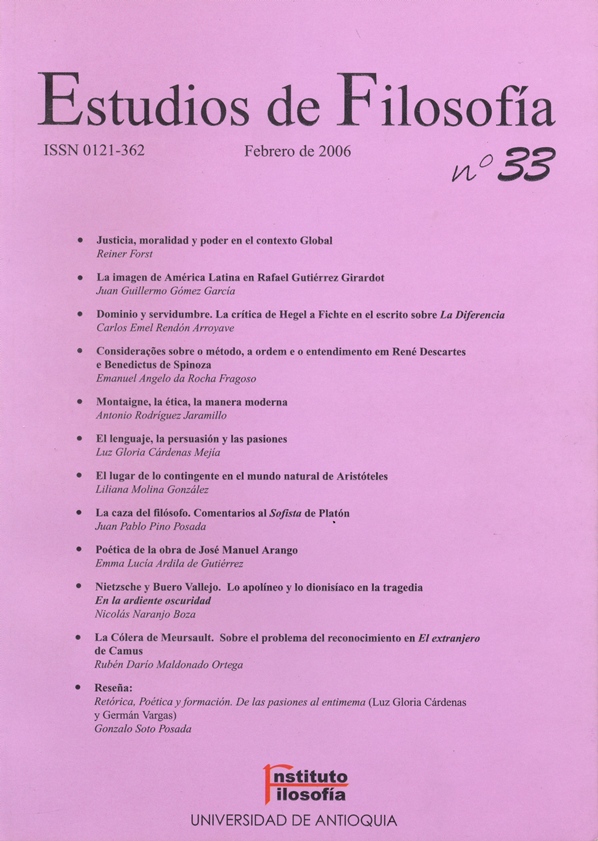Considerations on method, order and understanding in René Descartes and Benedictus de Spinoza
DOI:
https://doi.org/10.17533/udea.ef.12822Keywords:
Spinoza, Descartes, order, divine understanding, human understandingAbstract
The ordine geometrica is a splitting up of definitions and axioms that are self evident. The parallelism between both orders in Spinoza's System, the order cognoscendi and the order essendi, enables one to postulate the total intensity of the Real, which necessarily implies a likeness between the finite understanding, inasmuch as it is a producer of the former order, and the infinite understanding, inasmuch as it is a producer of the latter order, which is absent in Cartesian Philosophy. Mortral Gueroult, considers Descartes' Method as a geometrical one because it strictly obeys the rule that ensures all rigour in Geometry; while Spinoza's is so because, like Gemoetry, he constructs the concepts from the objects.
Downloads
References
Alquié, Ferdinand. Le Rationalisme de Spinoza. (2 ed.). París, PUF, 1991.
Amauld, Antoine; Nicole, Pierre. La Logique ou L'Art de Penser. Notes et posface de Charles Jourdain. Paris, Gallimard, 1992.
Descartes, René. (Euvres (13 vol.). Publiées par Charles Adam & Paul Tannery. Paris, C.N.R.S. et J. Vrin; v. I (1987), v. n, 111 (1988), v. rV (1989), v. V (1974), v. VI, vm-l, D (-l (1982), v.Vn (1983), v. Vin-2 (1987),v.X,XI(1986),v.DC-2(1978).
Ferreira, Maria Luisa Ribeiro. A Dinámica da Razäo na Filosofia de Espinosa. Lisboa, Calouste Gulbenkian, 1997.
Giancotti Boscherini, E. Sul Concetto Spinoziano di Mens, in: Crapulli, G.; Giancotti Boscherini, E. Ricerche Lessicali su Opere di Descartes e Spinoza. Roma, Ed. Dell’Ateneo, 1969.
Gueroult, Martial. Spinoza, v. 1(Dieu) e v. 2 (¿ Ame). Paris, Aubier-Montaigne, 1997. Macherey, Pierre. Introduction ä l 'Éthique de Spinoza. La secondepartie: la réalité mentale. Paris, PUF, 1997.
Misrahi, Robert “Introduction Générale e Annotations”, in: Éthique. Traduction, documents en annotations de Robert Misrahi. Paris, Vigdor, p.3-172, dec. 19. Texto eletrönico, http//www.imaginetfr/vigdor, 3 disquetes.
Netter, Abraham. Notes sur la Vie de Descartes et sur le Discours de la Methode. Nancy, Imprimerie Berger-Levrault, 1896, p. 7.
Spinoza, Benedictus de. Éthique. (2 v. em 1). Texte Latin, traduction nouvelle avec notice et notes par Charles Appuhn. Paris, J. Vrin, 1983.
_____________. Ética demostrada según el orden geométrico. Edición y traducción de Atilaño Domínguez. Madrid, Trotta, 2000.
____________ . Ética. Tradufáo e notas da Parte I de Joaquim de Carvalho, tradufäo das Partes II e III de Joaquim Ferreira Gomes, tradufäo das Partes IV e V de Antonio Simöes. Säo Paulo, Abril Cultural, 1. ed. 1972,2. ed. 1979,3. ed. 1983. (Colegäo Os Pensadores).
_____________. CEuvres de Spinoza. Traduites et annotdes par Charles Appuhn. Paris, Gamier, [ca. 1950]. Reimpressäo, Paris, Gamier-Flamarion, 1964-6, (4 v).
____________. Spinoza Opera. Im Auf tragder Heidelberger Akademieder Wissenschaften herausgegeben von Carl Gebhardt. Heildelberg, Carl Winter, 1925; 2 Auflage 1972, 4v.
___________. Principios de la Filosofía Cartesiana. Pensamientos Metafísicos. Introducción, traducción y notas de Atilano Domínguez. Madrid, Alianza, 1988.
Downloads
Published
How to Cite
Issue
Section
Categories
License
Copyright (c) 2006 Emanuel Angelo da Rocha Fragoso

This work is licensed under a Creative Commons Attribution-NonCommercial-ShareAlike 4.0 International License.
Authors who publish with this journal agree to the following terms:
1. The Author retains copyright in the Work, where the term "Work" shall include all digital objects that may result in subsequent electronic publication or distribution.
2. Upon acceptance of the Work, the author shall grant to the Publisher the right of first publication of the Work.
3. The Author shall grant to the Publisher a nonexclusive perpetual right and license to publish, archive, and make accessible the Work in whole or in part in all forms of media now or hereafter known under a Creative Commons Attribution-NoCommercia-ShareAlike (CC BY-NC-SA 4.0), or its equivalent, which, for the avoidance of doubt, allows others to copy, distribute, and transmit the Work under the following conditions: (a) Attribution: Other users must attribute the Work in the manner specified by the author as indicated on the journal Web site;(b) Noncommercial: Other users (including Publisher) may not use this Work for commercial purposes;
4. The Author is able to enter into separate, additional contractual arrangements for the nonexclusive distribution of the journal's published version of the Work (e.g., post it to an institutional repository or publish it in a book), as long as there is provided in the document an acknowledgement of its initial publication in this journal;
5. Authors are permitted, and Estudios de Filosofía promotes, to post online the preprint manuscript of the Work in institutional repositories or on their Websites prior to and during the submission process, as it can lead to productive exchanges, as well as earlier and greater citation of published work (see The Effect of Open Access). Any such posting made before acceptance and publication of the Work is expected be updated upon publication to include a reference to the Estudios de Filosofía's assigned URL to the Article and its final published version in Estudios de Filosofía.















